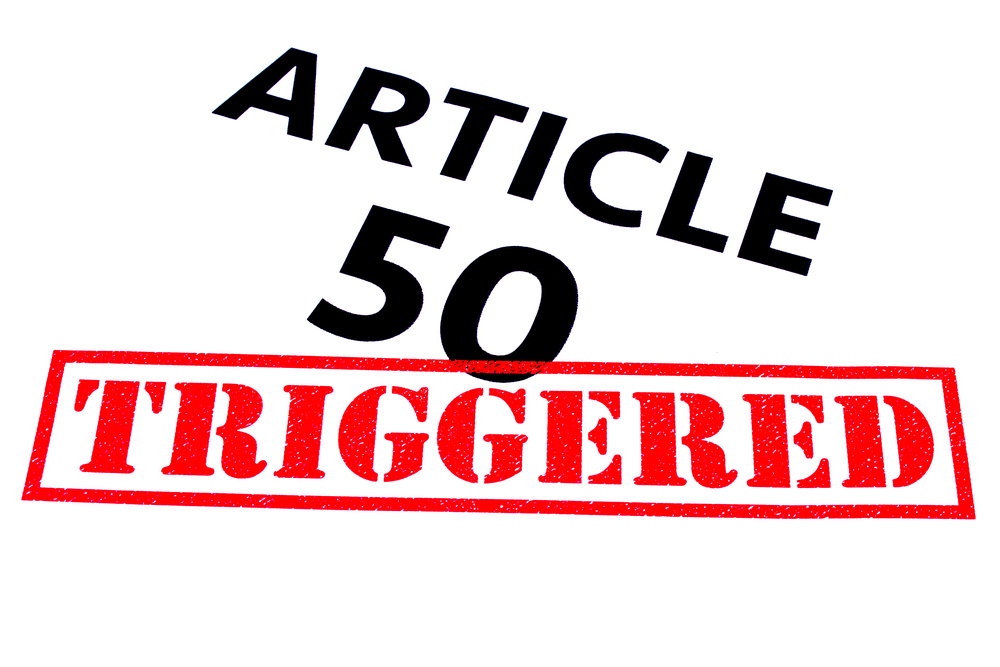Weekly Notes: legal news from ICLR — 3 April 2017
This week’s roundup of legal news and commentary is mainly about Brexit and what’s been happening – or not happening – in the courts, here and abroad. Brexit Trigger warning On 29 March, some 9 months after it had been mandated by the ‘will of the people’ as expressed in the EU referendum, Theresa May
This week’s roundup of legal news and commentary is mainly about Brexit and what’s been happening – or not happening – in the courts, here and abroad.
Brexit
Trigger warning
On 29 March, some 9 months after it had been mandated by the ‘will of the people’ as expressed in the EU referendum, Theresa May sent notification under article 50 of the EU Treaty of the UK’s intention to withdraw from the European Union. It was quite a long letter in the end, self-consciously rather tactfully expressed (for consumption by grown up European leaders, rather than the hysterical tabloid mob back home) and was duly received by Donald Tusk, the current President of the European Council. Given its historical significance, one wonders why it was not inscribed on vellum; at any rate, it was important enough not just to send a text or tweet. As a letter, it may not be the longest suicide note in history (that was reputedly the Labour Party manifesto of 1983) but it must be the longest anticipated.
It set in motion a two-year period of negotiations over the terms of the UK’s de-accession to the European Union. There will be, if not hell to pay, some very large sums of money. The figure of £60bn has been mentioned. Accusations of bad faith began, if they had not already begun, almost immediately. Mrs May was said to be prepared to use cross-border cooperation on security as a bargaining chip, as well as the fate of expat Brits and Europeans, but to be fair that is not how the letter reads. Rather, it reads as though May is anxious to ensure that those matters are settled as soon as possible and thus preserved from the risk of compromise in the cross-fire of tit-for-tats over travel and trade.
The following day the government issued its white paper on the procedural and legislative challenges involved in preserving and maintaining the domestic continuity of EU-derived law following Brexit. What is called the Great Repeal Bill should probably be called the Great Repeal, Re-enactment and Consequential Amendment by Delegated Powers Bill.
Among the points discussed was the continuing relevance and applicability of the case law of the European Court of Justice: we wrote about this in a post entitled Is reporting EU case law now a waste of time?
For more commentary, see:
- Professor Mark Elliott, Public Law For Everyone: The Government’s White Paper on the Great Repeal Bill: Some Preliminary Thoughts
- Professor Steve Peers, EU Law Analysis: The White Paper on the Great Repeal Bill: Invasion of the Parliamentary Control Snatchers
- Jolyon Maugham QC, Waiting for Tax: Can we unilaterally revoke article 50? An answer to concerns
- Joshua Rozenberg, Law Society Gazette: Transfer window (Brexit should shift power from Brussels to Westminster — not Whitehall)
- Angela Patrick, background paper (dated October 2016) for Thomas Paine Initiative (via Rights Info) Mapping the Great Repeal Bill
Digital government
NAO report on GDS finds ‘mixed success’
The National Audit Office issued its report on Digital Transformation in Government on 30 March 2017. It concludes that attempts to transform government have had mixed success, and although it did well in the early days after it was first set up, there is now a risk that the expanded Government Digital Service (GDS) is trying to cover too broad a remit with unclear accountabilities.
Digital transformation has a mixed track record across government. It has not yet provided a level of change that will allow government to further reduce costs while still meeting people’s needs. To achieve value for money and support transformation across government, GDS needs to be clear about its role and strike a balance between robust assurance and a more consultative approach.
See also: Public Technology, Verify business case ‘undermined’ by its performance, as GDS ‘struggle to adapt’ to changing role
In the courts
Marine A sentence varied
The Court of Appeal (Criminal Division) sitting as the Court Martial Appeal Court delivered its sentencing remarks following the successful second appeal of Sgt A Blackman, aka Marine A (R v Blackman (No 2) [2017] EWCA Crim 190), which we last wrote about in Weekly Notes —20 March 2017. Having reduced the offence to manslaughter, the court also reduced the term of Blackman’s imprisonment, so that he is expected to be released fairly soon.
Monroe v Hopkins appeal blocked
A late application by Katie Hopkins for permission to appeal against Warby J’s judgment [2017] EWHC 433 (QB) awarding damages for defamation and interim costs to the claimant, Jack Monroe, was refused by the judge in a further judgment [2017] EWHC 645 (QB). We wrote about the judgment on liability in Weekly Notes — 13 March 2017.
UPDATE: Inforrm’s blog reports that Hopkins has now applied to the Court of Appeal for permission, and sets out the grounds of appeal. It appears that Hopkins has now instructed solicitor advocate David Price QC as well as Jonathan Price.
Late sittings (1)
Lord Neuberger has proposed raising the age of judicial retirement from 70 to 75, to avoid the waste of experienced wisdom and talent that the current cut-off point mandates. See The Guardian, Allow judiciary to work until 75, says Britain’s most senior judge. It might also help resolve the current recruitment crisis in the judiciary, reported here.
Late sittings (2)
While many courts have been closed, to save money, the Ministry of Justice has now proposed that those which remain open should sit for longer hours, until as late as 8.30pm. Pilot schemes in six courts will run in May, according to the Law Society Gazette. Professional bodies such as the Law Society and Bar Council have questioned the benefits of late sittings, while pointing out the adverse impact on the work-life balance of lawyers, many of whom do considerable amounts of work before and after court hearings each day, as well as often spending considerable time travelling.
See also the response of the Criminal Law Solicitors Association.
A petition has been launched in response to the MOJ’s proposal, urging the government not to proceed further with the late sittings plan. It points out that
It is unfair and discriminatory for Court staff, Judges, Barristers, Solicitors, and court users, particularly those with children. It will have a detrimental impact on well-being and diversity at the Bar and Judiciary.
Arguably the same sort of problems must be faced by other late-night workers, such as NHS doctors, nurses and staff, the police and emergency services, and shop and restaurant workers when expected to work at late or unsocial hours. But the response to this question on Twitter was overwhelmingly to point out that most other kinds of shift work was (a) dictated by the job itself, whereas there is no essential reason for courts to sit at night; and (b) work itself was confined to within the shifts (and possibly travel) because those other types of work did not involve hours of intensive preparation, often at short notice, before the next court shift, as it were.
April follies
There were some amusing spoofs to mark April Fool’s day on Saturday. We round up the best of them here.
Dates and Deadlines
2017 LALYS awards
The 2017 Legal Aid Lawyer of the Year awards have been launched, with nominations now open for 11 award categories. The awards ceremony takes place in London on Wednesday, 5 July 2017.
See LAPG’s website for the full awards list.
London Legal Walk — Monday 22 May
In 2016 over 10,000 people took part and raised over £740,000. For details on how to register your team for the 10km walk and start fundraising, see London Legal Support Trust
Law (and injustice) from around the world
America
Flynn immunity blocked
Last week a lawyer speaking on behalf of President Trump’s former national security adviser Michael Flynn said he would be wiling to testify before congressional committees and federal officials investigating Russian meddling in the 2016 election only if he was granted immunity from “unfair” prosecution, reports The Hill. However, according to NBC News, the Senate Intelligence Committee has turned down the request.
Flynn was dismissed from his role in the White House in February after he misled Vice President Pence and other officials about his discussion of U.S. sanctions on Russia with Russian ambassador Sergey Kislyak.
Commenting on the request for immunity, Harvard Law professor Alan Dershowitztold The Hill that it is unusual for such a request to be made in public: it would normally be negotiated “behind the scenes”. Moreover, it would not be complete bar to possible prosecution, using evidence collected prior to the immune testimony:
What the prosecutors can do is they can create a lock box in which they put all the evidence that they already have prior to his testimony given under immunity, and they can use all of that testimony to prosecute him,” he said.
India
Courts to sit in vacation to clear backlog
India’s recently appointed Chief Justice J S Khehar has asked judges, including those of the Supreme Court, to sit during the law vacation to help clear a massive backlog of pending cases, according to LiveLaw News. The problem has partly been caused by a shortage of judges.
The Supreme Court has set an example by agreeing to hear over five thousand cases during its summer vacation from 5th May, 2017 to 2nd July 2017.
India’s justice system is notorious for its inordinate delays, but steps are being taken to speed things up with the use of technology. According to the Law Society Gazette, last May, reporting on the previous Chief Justice’s plea for more judges (India’s top judge pleads for help to clear backlog of cases):
Cases lasting decades over tiny sums of money frequently make headlines in India. One that has lasted four decades involves a Delhi bus conductor accused of defrauding his employer of 1/20th of a rupee by undercharging a passenger by 5 paise (0.05p)
And finally… Tweet of the week
Not sure what to feel about triggering article 50 and the beginning of the end? Neither is Cass Horowitz
Just popped to the card shop to get some #BrexitDay cards. Not sure which section I should be looking in 🤔 pic.twitter.com/bhZYxaUPOE
— Cass Horowitz (@CassHorowitz) March 29, 2017
That’s it for now. Our thanks to all who flagged up stories, via their blogs (which we always try to acknowledge) and via Twitter (where useful tweets are retweeted).
This post was written by Paul Magrath, Head of Product Development and Online Content at ICLR, who also tweets as @maggotlaw. It does not necessarily represent the opinions of ICLR as an organisation. Comments welcome on Twitter @TheICLR.
Sign up now for weekly email alerts from this blog. Just put your email address into the box on the left.

